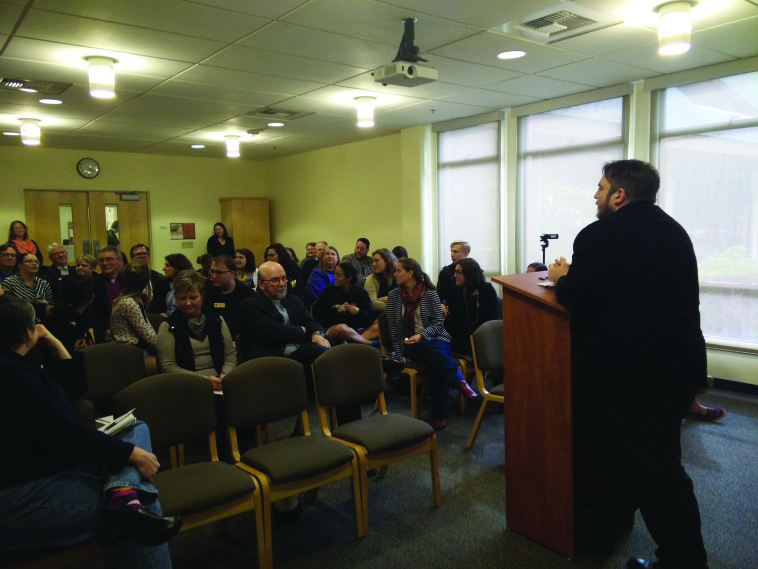LUCAS SCHAUMBERG
News Writer
schaumlc@plu.edu
Religion professor Antonio Finitsis published a story on September 8 declaring the Syrian Immigrant crisis as a humanitarian conflict.
The Syrian Civil War, now more than four years old, continues to tear apart the state, and shows no possibility of ending within the next five years.
President Bashar al-Assad continues his barbarism from Damascus, while ISIS controls huge swaths of land the north and east, prompting an exodus of more than 50 million refugees. While the horrors of the conflict may be 10,658 miles away, the suffering is closer than we think to our PLU world.
Antonio Finitsis is a professor of religion, in particular studying the plight of Israelites in the Torah and Talamud. Within those stories, he witnesses hardships akin to what Syrians now face. He is familiar with apocalyptic violence a passionate eschatologist, he studies texts describing the end of times.
“We don’t need religious texts or an apocalypse to know there will be a wave of violence in the next five or 10 years,” Finitsis said, gesturing to an overflowing bookshelf. “And who will they blame it on then?”
He wrote his story on the PLU website and in the News Tribune. He said he “wrote because he could not put the experience into words.”
Finitsis described a need for westerners to understand this conflict is more than a political problem and acknowledge the humanity of the refugee crisis.
The professors tone is impassioned and learned, but a frustration leaks into his voice when the subject turns to current policies surrounding the immigrants. While a majority of politicians seem to recognize the horror in the Syrian Exodus, he points out that a majority of left and right parties across the EU view immigrants primarily as a financial burden. Finitsis describes this as “thinking in nickels and dimes.”
Finitsis’ story of the immigrants on Chios, a small Greek island, captures some of the fresh hells that Syrians attend to daily. Reports of travelers drowning in the Mediterranean surface daily- on the 13th, over 38 drowned off the coast of Greece. Most have seen a family member killed, many only have a single change of clothes.
States that do not allow immigrants subject Syrians to bitter reminders of the violence that decimated their abandoned nation.
In World War II, Finitsis’ grandfather had helped Jews escape the island and the vise of Nazi rule. He gave passage to families living in Chios, smuggling them in cramped boats navigating the Aegean sea into Turkey.
He ended up escaping to Ethiopia out of fear for his wife and young child, promising them that one day, they would return their home on the Mediterranean island.
“He wanted to return and he eventually did. His home was wrecked and broken into but he came back,” says Finitsis. “The Syrian immigrants want to return too. But unlike World War II, no one knows when the conflict will end. No one has any ideas of how to end it.”
That same ocean now holds boats overfilled with Syrian immigrants. It is a midpoint in a Syrian’s first leg of a journey up to 1,335 miles long. It is also where Finitsis wandered into the lives of two refugees.
The story shares the experience of watching children of six and eight wordlessly eating, young boys sharing a brief moment of innocence on a journey that had robbed them of any semblance of a life recognizable to the Westerners passing by. They were on one small leg of a journey through Greece and were already ragged and disheveled. Professor Finitsis did not know where they were sleeping. Perhaps in the island’s graveyard, which some immigrants took to sleeping in, he had seen bodies in tattered clothes resting on the flat ground there.
Finitsis drew out parallels to the experience of African-Americans at the hands of police brutality. In his class, he gives lectures on how “when the hunter backs his prey into a corner, the prey will do anything to fight back.” He prophesies that the same thing will occur in the aftermath of the mass exodus. “These people have to do everything to stay alive and then they are blamed for doing so.”
At times he addresses his listeners directly, often in the form of a rhetorical question. “Imagine yourself as a Syrian immigrant,” he asked. “You are tear gassed and shot at with rubber bullets. How would you react to that? How would you feel about your new state?’
“The job you and I have, as people with privilege, is to humanize. We lose our own humanity when we view them as anything less.”
A lot of political discussion is being spent in this day and age on America’s declining leadership in the world. Finitsis wants of us to show the world just that. He wants us to show something other than just the might of our arms: how warmly we can open them.

















